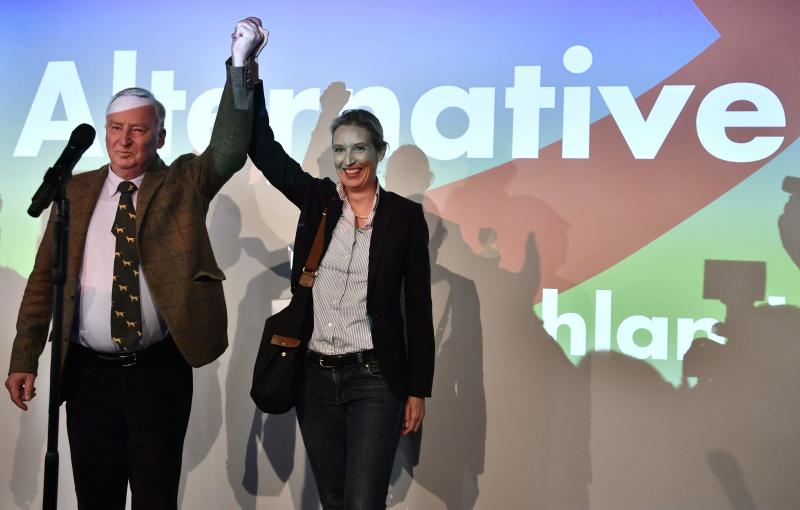News analysis
Big winner in German elections not Angela Merkel, but far-right, anti-immigrant movement
Sign up now: Get ST's newsletters delivered to your inbox

Top candidates of the Alternative for Germany (AfD) Alexander Gauland (left) and Alice Weidel celebrate in Berlin on Sept 24, 2017.
PHOTO: AFP
Follow topic:
Exit polls and early counting from Germany's general elections indicate that although Chancellor Angela Merkel is virtually guaranteed to remain in office, both her ruling Christian Democratic Union (CDU) and the main opposition Socialists (SPD) have sustained spectacular losses.
The real winner of the ballots is a far-right, anti-immigrant new political movement, which is now destined to transform Germany's political scene. The vote represents an upset of monumental proportions, one with wide implications for the rest of Europe.
Early projections indicate that Chancellor Merkel's CDU has attracted 33.1 per cent of the vote, considerably less than the 41.5 per cent the CDU won in the last general elections back in 2013. Meanwhile, the left-leaning SPD main opposition party appears to be running a distant second with only 20.4 per cent of the ballots, a full 5 per cent less than it had in the outgoing parliament, and the worst result recorded for the SPD since the creation of the current German federal republic at the end of World War II.
But the real surprise is the performance of the far-right Alternative for Germany (or AfD as it is known by its German-language acronym) a party which was established only four years ago and was often dismissed as a fringe movement of no consequence; it has now risen from virtually nowhere to be the third-biggest party in the new German parliament, with no less than 13.2 per cent of the vote, an astonishing outcome not recorded by any other newly-established party in Germany's modern history.
As the first exit polls were released, Ms Alice Weidel, the AfD's co-chair, told jubilant supporters that "millions of voters have entrusted us with the task of constructive opposition work in parliament".
The rest of the country's political landscape also appears to be deeply divided in ways never encountered before: The centrist and business-friendly Liberals who used to be the backbone of Germany's previous coalitions have ended a period in the political wilderness by gaining 10 per cent of the vote and a solid parliamentary representation, while the Left - composed of the communists of former East Germany - and the Green ecologist movement are predicted to get 9 per cent of the votes each.
For the moment, most of the German media's attention has concentrated on the Socialists, who were crushed in the polls and now face years of recriminations. Yet as the shocking results of the elections sink in, the spotlight will return to Chancellor Angela Merkel, who has run a very personal campaign based largely on her record in government since 2005 when she gained power. She was slated by all opinion polls to be coasting for an easy victory but ended up with the worst electoral result recorded by the ruling CDU since she took over as leader. And the poor result is made even more stinging by the realisation that up to 1 million traditional CDU voters may have defected to the far-right AfD.
In her first reaction to the results, Dr Merkel tried to minimise the damage to her reputation and rally her loyal followers: "The CDU would have hoped for better result" she admitted, "but we mustn't forget - looking back at an extraordinary challenge - that we nevertheless achieved our strategic objectives: we are the strongest party. We have mandate to form the new government and we will form the new government".
That won't be easy. The initial assumption in Berlin was that the Chancellor will lead a "grand coalition" with the SPD, as she has done over the past four years. But that is no longer feasible, nor are the SPD willing to remain in government; they need to return to the opposition benches, and nurse their wounds.

So the only alternative for Angela Merkel is to form a coalition with the Liberals and Greens, an alliance which is feasible, but which will also be fractious.
And meanwhile, the rest of Europe will watch with apprehension. For the rise of the AfD signifies a hardening of the German political scene, a shift to a more nationalist and less European Germany.
The Chancellor's dedication to Europe and to a Germany which remains open to migrants and tolerant of ethnic minorities is beyond question; the snag is that both she and the old German political establishment she represents are increasingly less popular with ordinary German voters.

